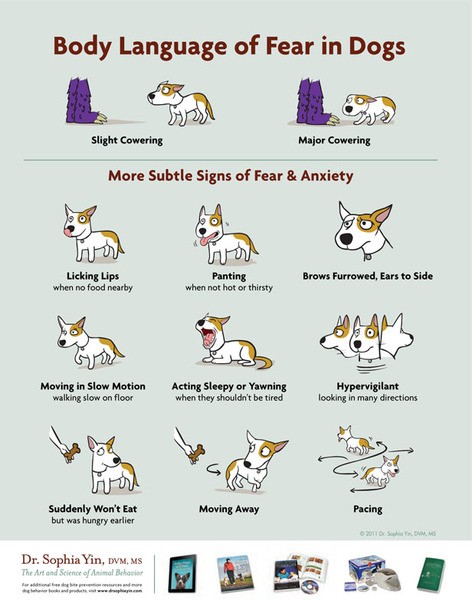“This post contains affiliate links, and I will be compensated if you make a purchase after clicking on my links.”
Since our dogs can’t tell us with words when they’re feeling afraid or uncomfortable, it’s up to each and every one of us to understand the language they do speak – body language!
Some of the signs of fear and anxiety are quite obvious – others are much more subtle.
We very often hear “the dog just snapped out of nowhere!” But, that’s rarely the case. Dogs have a wide variety of “tells,” subtle body language that, if you’re familiar with it, will alert you to a dog’s comfort level.
Study this simple, easy to remember infographic from renowned trainer Sophia Yin. Then watch your own dogs and the dogs you interact with – do you recognize any of these subtle signs of fear or anxiety?




















Omer
Nov 9, 2017 at 11:01 am
Excellent information right here. Most people are not even aware of how important body language is. Actually, people use to rely on verbal communication almost solely when communicating with other people, so it is no surprise to me that they do the same with pets, especially dogs. For most people, as long as the dog is not barking – everything is OK.
As a parent and dog lover myself, this is my POV: If you want to have a dog as a friend, then be a friend to your dog.
Learn to communicate with them, be gentle and sensitive and remember that dogs will give you unconditional love. They are called man’s best friend for a very good reason. All you have to do in order not to get yourself bite is to remember that they cannot just tell you they are upset, sick or scared. It is YOUR responsibility to learn what are the signs.
Pingback: Behavior and Training | Nextruck
tara
May 30, 2014 at 6:14 pm
praying for you, elaine. i, too, have a rescue of two years with several medical issues (after he spent his first 6 in a cage, never allowed out…EVER…presumably a puppy mill down south) who is afraid of EVERYthing….it is better but i think he has been permanently traumatized. he learned dogging from his rescued sister…she taught him all he knows of living outside a cage…who’s bed it really is….how to be a watchdog…how to ignore momma, aka granny….how to do tricks…etc etc….she was placed into the arms of Jesus just one month ago, and we almost lost him to a broken heart….so the vet and i agreed…he needs a new friend. so last week, a senior lovebug joined us…a 12yo female cocker spaniel who my benyamin is now teaching how to be loved, and where doggie section is…where HER section is on HIS bed….(i don’t need much space) etc etc.
he will always be fearful, but there is something to be said about being alone….it is not a good thing!
just a suggestion….but it sounds like you have a big heart…and there’s ALways room for another!!!
God’s blessings
Elaine Gloeckle
May 30, 2014 at 12:57 pm
I thought my rescued mini schnauzer was fearless. But he displays every single one of these “symptoms” plus his back hackles are pretty much up all the time. He is very loving, we’ve had him for 2 years – he’s an estimated 5 now, and I don’t know what to do to ease his anxiety. He’s got some medical issues too, epilepsy and heart issues, so he’s on meds that may increase his anxiety. Any helpful hints?
Laura Murray
May 30, 2014 at 1:09 pm
Hi Elaine,
Sorry your and your pooch are going through such a difficult time. Sometimes dogs can see, smell and hear things that we can’t and it can cause anxiety reactions. It is best to seek the help of a Veterinary Behaviorist near you to help you narrow down the actual source of the anxiety and help you work through a solution. When searching for a V.B., please make sure to look into their certifications and be certain that they have actually had the proper training to help you. There are a lot of frauds out there that can make matters worse. Good luck.
Canine Paws Abilities
Jun 3, 2014 at 6:33 pm
Elaine, I’m so sorry about your
‘baby’. Some of the things you can help him with are; calming collars, lavender essence oil placed in small amounts on cotton balls under his bed and throughout the house, a Thundershirt, and with your doctor’s approval Prozac or some other med to take the edge off if he is really bad. There are also some cd’s for calming him down. Take him for walks, this is very beneficial, both health wise and mentally stimulating. I would ask that you contact a behaviorist in your neighborhood. As a behaviorist in Alabama, I can tell you that with the proper directions and tools, he can get better. It’s extremely important that you don’t play into his fear, this will only make it worse. Good luck and give him a big hug for me!
Canine Paws Abilities
Jun 3, 2014 at 6:38 pm
Also, I wish you would consider an older, layed back ‘friend’ for him. There are great choices at the Humane Society where you live. You don’t want a dog however with too much energy! How is he when he meets other dogs and humans?